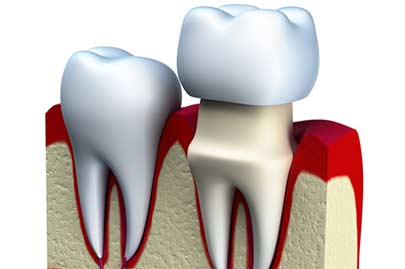
19
Mar
The Dolton IL tooth crown procedure difference – Bite into the benefits

The average dental practice in the U.S. places about 13 crowns as single tooth restorations each month, according to Dentistry IQ. With almost 200,000 active dentists, a large percentage of the population has at least one crown. As popular as they are, the tooth crown procedure often varies from practitioner to practitioner. Even “insignificant” differences have a big influence on patient experience. Dr. Dean Dietrich and his team in Dolton IL take patient satisfaction very seriously. So, all visitors’ experiences live up to the “Pleasant Dental® ” name.
Crown background
Peek in the mirror. Smile! See that white part above the gumline? Those are your natural crowns. Each pearly enamel shell covers a softer layer and blood vessels and nerve tissues. Crowns protect these important bits, and assist in healthy biting, tearing, and grinding of food (for proper digestion). Crowns provide support to your face, and aid in clear speech and normal breathing. Since crowns are critical for so many functions, damage to this natural tooth structure has far-reaching consequences.
Dr. Dietrich and the team at Pleasant Dental® use natural-looking and durable dental materials to recreate the damaged portions of the crown. Like how a “royal crown” fits snugly over a person’s head, dental crowns securely fit over natural, prepared tooth structure. For this reason, crowns are also known as “caps.”
Skillfully designed and expertly placed, crowns at Pleasant Dental® look, feel, and “behave” no differently in your mouth than natural teeth. No special maintenance is required. Since they’re like natural teeth, crowns should be flossed and brushed like you always would with one notable difference: Give a little bit of extra attention to the margins – that’s the space between the natural tooth and the crown. Diligently brush the area near the gums around the crown as this is the most likely area for decay to start. After all, you deserve healthy function and stunning looks for years to come!
A crown for every occasion?
Like natural crowns that have many important responsibilities, dental crowns are versatile. As one of the oldest types of dental restorations, patients benefit from the procedure’s mix of time-tested benefits and advancements in dentistry techniques and materials.
Do any of the characteristics below sound like your teeth? If so, you may benefit from these resilient, attractive dental restorations.
- Repair large areas of decay
- Replace broken-off portions
- Hold fractured tooth pieces together
- Protect a root canal-treated tooth
- Build up worn teeth
- Support a large filling (with little remaining natural tooth structure)
- Anchor a bridge (artificial teeth are held in place by neighboring crowns)
- Restore a dental implant rooted in the jaw to replace a missing tooth
- Improve the appearance of very discolored, poorly-shaped and unevenly-sized teeth
Going the extra mile for a pleasant procedure

Patients new to Pleasant Dental® are often pleasantly surprised to find their first introduction to the doctors isn’t an impersonal, intimidating muffled and masked face looming over them in the treatment chair. The doctor will explain the many benefits of the crown procedure during a one-on-one consultation. When combined with root canal treatment, a crown may be the only way to save a badly decayed or damaged tooth and avoid the need for extraction! Patients are encouraged to ask our doctors about the procedure, and treatment alternatives. As a patient, you play an active part in treatment. For instance, what dental material do you prefer to restore your tooth? From gold to porcelain, each material has its pros and cons. Gold can’t be beat for its durability. Porcelain blends in beautifully with your other teeth.
You will find we are committed to quality dentistry at a reasonable price – no nickel and diming here! Patients across the suburban Chicago area, from South Holland to Calumet City, Lansing, Homewood, and Flossmoor, trust Pleasant Dental® for affordable tooth crowns that last. Call (708) 576-1900 for an appointment.

Dr. Dean Dietrich – Pleasant Dental®
Dr. Dean Dietrich founded Pleasant Dental® with the vision of serving his community by providing high-value comfortable care. Dr. D. has over 30 years of expertise and continues to be very passionate about his work. He and team enjoy caring for fearful patients and providing care in a unique upbeat, even fun way.




